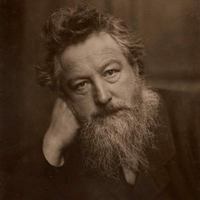Of the Three Seekers
There met three knights on the woodland way,
And the first was clad in silk array:
The second was dight in iron and steel,
But the third was rags from head to heel.
“Lo, now is the year and the day come round
When we must tell what we have found.”
The first said: “I have found a king
Who grudgeth no gift of anything.”
The second said: “I have found a knight
Who hath never turned his back in fight.”
But the third said: “I have found a love
That Time and the World shall never move.”
Whither away to win good cheer?
“With me,” said the first, “for my king is near.”
So to the King they went their ways;
But there was a change of times and days.
“What men are ye,” the great King said,
“That ye should eat my children’s bread?
My waste has fed full many a store,
And mocking and grudge have I gained therefore.
Whatever waneth as days wax old,
Full worthy to win are goods and gold.”
Whither away to win good cheer?
“With me,” said the second, “my knight is near.”
So to the knight they went their ways,
But there was a change of times and days.
He dwelt in castle sure and strong,
For fear lest aught should do him wrong.
Guards by gate and hall there were,
And folk went in and out in fear.
When he heard the mouse run in the wall,
“Hist!” he said, “what next shall befal?
Draw not near, speak under your breath,
For all new-corners tell of death.
Bring me no song nor minstrelsy,
Round death it babbleth still,” said he.
“And what is fame and the praise of men,
When lost life cometh not again?”
Whither away to seek good cheer?
“Ah me!” said the third, “that my love were anear!
Were the world as little as it is wide,
In a happy house should ye abide.
Were the world as kind as it is hard,
Ye should behold a fair reward.”
So far by high and low have they gone,
They have come to a waste was rock and stone.
But lo, from the waste, a company
Full well bedight came riding by;
And in the midst, a queen, so fair,
That God wrought well in making her.
The first and second knights abode
To gaze upon her as she rode,
Forth passed the third with head down bent,
And stumbling ever as he went.
His shoulder brushed her saddle-bow;
He trembled with his head hung low.
His hand brushed o’er her golden gown,
As on the waste he fell adown.
So swift to earth her feet she set,
It seemed that there her arms he met.
His lips that looked the stone to meet
Were on her trembling lips and sweet.
Softly she kissed him cheek and chin,
His mouth her many tears drank in.
“Where would’st thou wander, love,” she said,
“Now I have drawn thee from the dead?”
“I go my ways,” he said, “and thine
Have nought to do with grief and pine.”
“All ways are one way now,” she said,
“Since I have drawn thee from the dead.”
Said he, “But I must seek again
Where first I met thee in thy pain:
I am not clad so fair,” said he,
“But yet the old hurts thou may’st see.
And thou, but for thy gown of gold,
A piteous tale of thee were told.”
“There is no pain on earth,” she said,
“Since I have drawn thee from the dead.”
“And parting waiteth for us there,”
Said he, “As it was yester-year.”
“Yet first a space of love,” she said,
“Since I have drawn thee from the dead.”
He laughed; said he, “Hast thou a home
Where I and these my friends may come?”
Laughing, “The world’s my home,” she said,
“Now I have drawn thee from the dead.
Yet somewhere is a space thereof
Where I may dwell beside my love.
There clear the river grows for him
Till o’er its stones his keel shall swim.
There faint the thrushes in their song,
And deem he tarrieth overlong.
There summer-tide is waiting now
Until he bids the roses blow.
Come, tell my flowery fields,” she said,
“How I have drawn thee from the dead.”
Whither away to win good cheer?
“With me,” he said, “for my love is here.
The wealth of my house it waneth not;
No gift it giveth is forgot.
No fear my house may enter in,
For nought is there that death may win.
Now life is little, and death is nought,
Since all is found that erst I sought.”

